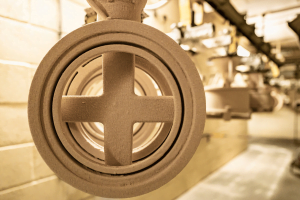Published - 30th Apr 2024
Investment casting can be carried out in air, or in a vacuum. In this blog, we compare the two processes and look at the benefits of each when casting components from nickel-base superalloys.

As metals are heated and cooled, they react with elements in their environment which can change their chemical and physical properties. The investment casting process must be carefully managed to ensure that the finished casting will meet specification.
Two basic processes are used in investment casting:
It is important that the investment casting process protects or enhances the properties of the material to be cast. This is particularly important when casting material such as nickel-base superalloys, which are often specified for their high-performance properties in extreme heat or corrosive environments.
Superalloys are high-performance metallic materials which display excellent resistance to mechanical and chemical degradation, even at temperatures close to their melting point.
Nickel-base superalloys may be specified for:
Casting under a vacuum demands specialised equipment. Vacuum induction furnaces are expensive to set up and maintain, and this cost must be passed on to the customer. Vacuum investment casting should only therefore be used when necessary to achieve the required specifications.
Where an application demands superior mechanical properties at high temperatures, nickel-base superalloys should be vacuum cast. Vacuum investment casting protects the metal from the formation of oxides and nitrides that are deleterious to strength at high temperature.
Air investment casting is the optimal choice for components cast from nickel-base superalloys specified for high corrosion resistance.
It is widely assumed that nickel-base superalloys cannot be cast in air – but they can!
Where nickel-base superalloys are specified for highly corrosion-resistant components, and there is no requirement for performance at extreme high temperatures, air investment casting is a lower cost alternative.
Air casting preserves the excellent corrosion resistance of nickel-base superalloys, providing components that are highly durable and will resist corrosion even in the harshest conditions. This means that air investment casting is well-suited to applications such as pumps and valves in the chemical processing industry.
Air casting does not require a vacuum, so is a more cost-effective process than vacuum casting.
As we have seen, the choice of air or vacuum investment casting for nickel-base superalloy components depends on the qualities for which the superalloy has been specified.
Nickel-base superalloy components for applications demanding excellent strength at high temperatures should always be vacuum cast, to preserve that strength.
Nickel-base superalloy components for applications demanding excellent corrosion resistance can be manufactured more cost effectively by air investment casting.
Investacast has long expertise in casting corrosion resistant nickel-base superalloys in air, without a vacuum.
Air investment casting of nickel-base superalloys is effective at Investacast because:
Please get in touch for advice on which method is best suited to your application – our experts are always happy to help.
If you have a project, talk to our experienced sales team
Contact us